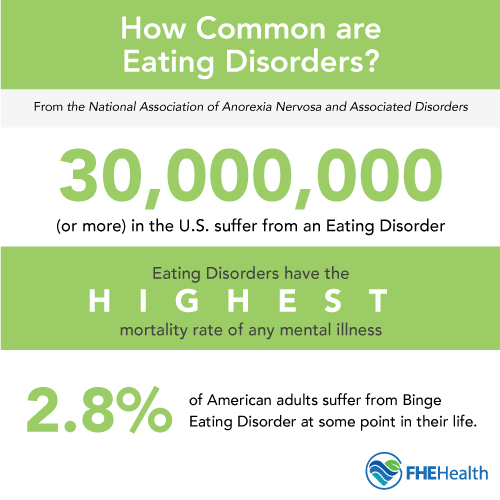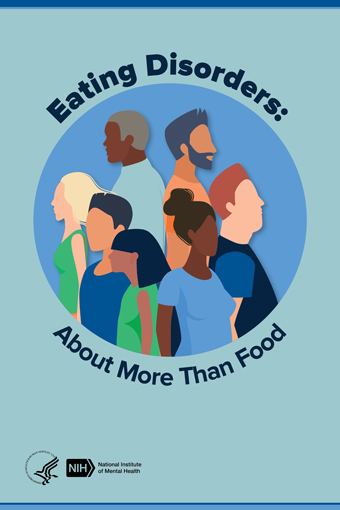Some Known Facts About Eating Disorder Recovery.
Wiki Article
Top Guidelines Of Eating Disorder Recovery
Table of ContentsEating Disorder Recovery Can Be Fun For Anyone9 Easy Facts About Eating Disorder Recovery DescribedWhat Does Eating Disorder Recovery Mean?The Only Guide to Eating Disorder RecoveryThe Of Eating Disorder Recovery

Orthorexia is a kind of eating problem, still unknown in the DSM, in which an individual becomes stressed with "healthy and balanced consuming." While several individuals emphasize to be conscious of the active ingredients and also sourcing of their food, orthorexia can come to be damaging to the person's health. Orthorexia creates individuals to determine specific food or food teams as "correct," "healthy," or "pure." At some point, specific foods or entire teams are gotten rid of from the individual's diet regimen; they may likewise begin to stress over the active ingredients in their foods, spending hours daily preparation dishes (eating disorder recovery).
Food active ingredients may also become the person's only subject of discussion. Orthorexia is additionally a typical co-occurring problem associated with OCD.
Some Ideas on Eating Disorder Recovery You Need To Know
With this disorder, a person will strictly stay clear of specific foods to the detriment of their health and wellness - eating disorder recovery. Unlike orthorexia, nevertheless, the avoidance of specific foods isn't driven by notions of the food's healthiness or pureness, however instead by an extreme hostility to the food's taste, appearance, or odor (although issues about spoilage or food poisoning may likewise exist).In time, even more and more foods come to be untenable, causing an extremely limited combination of acceptable foods. Formerly called careful eating condition, ARFID usually starts in youth and considerably aggravates gradually. It's reasonably usual for youngsters to be "choosy eaters" and everybody has preferences for what they consume, but if it becomes uncontrollable as well as detrimental to a person's health and wellness, it warrants a check-in with an eating disorder therapy expert.
Also like orthorexia, an adverse or distorted body photo is not necessarily a reason of the condition. ARFID is usually treated utilizing talk therapy and cognitive re-training such as Cognitive Behavior Modification (CBT). Unlike the majority of eating disorders which normally first existing throughout teenage years, rumination disorder is most usual in infancy and also early childhood years, although it can continue right into the adult years.
Some Ideas on Eating Disorder Recovery You Need To Know
Normally, they do not experience tension or disgust when spewing, neither do they appear to make an effort to vomit (as seen in bulimia nervosa). Rumination problem is often a reaction to an unreasonable concern of health problem brought on by consuming, although its reasons are much less well-understood than other eating problems.

Orthorexia is a form of eating Check Out Your URL problem, still unacknowledged in the DSM, where an individual becomes consumed with "healthy eating." While lots of people emphasize to be knowledgeable about the ingredients as well as sourcing of their food, orthorexia can become detrimental to the person's health and wellness. Orthorexia creates individuals to identify specific food or food groups as "correct," "healthy and balanced," or "pure." At some point, specific foods or whole teams are gotten rid of from the person's diet plan; they might also start to consume over the active ingredients in their foods, investing hrs every day planning dishes.
How Eating Disorder Recovery can Save You Time, Stress, and Money.

With this disorder, a person will purely prevent specific foods to the detriment of their health. Unlike orthorexia, nevertheless, the evasion of certain foods isn't driven by ideas of the food's healthiness or pureness, however rather by a severe hostility to the food's taste, structure, or smell (although worries about wasting or food poisoning may also exist).
Gradually, increasingly more foods end up being illogical, resulting in an exceptionally limited palette of appropriate foods. Formerly recognized as careful eating problem, ARFID typically begins in childhood years and also considerably aggravates in time. It's fairly typical for kids to be "picky eaters" as well as everyone has choices wherefore they consume, yet if it becomes compulsive and also harmful to an individual's health, it requires a check-in with an eating condition treatment specialist.
Not known Details About Eating Disorder Recovery
Also like orthorexia, a negative or altered body image is not always a source of the problem. ARFID is usually dealt with using talk therapy and also cognitive re-training such as Cognitive Behavior Treatment (CBT). Unlike the majority of eating problems which usually first present during adolescence, rumination disorder is most common in infancy and very early childhood, although it can persist into the adult years.Usually, they do not experience anxiety or disgust when throwing up, nor do they show up to make an initiative to vomit (as seen in bulimia nervosa). Rumination problem is commonly a response to an irrational fear of illness triggered by consuming, although its causes are less well-understood than other eating disorders.
Rumination disorder is noted in the DSM-V. other One of the most harmful kinds of consuming disorder, ED-DMT1 (informally called diabulimia), takes place when a person with type-1 diabetic issues deliberately misses their insulin dosage to slim down. Diabulimia More Bonuses is provided as one of the many unspecified eating disorders under the catchall term OSFED (Other Specified Feeding r Consuming Problem).
Report this wiki page